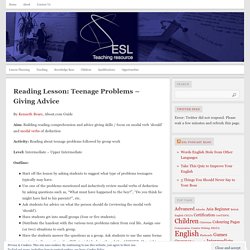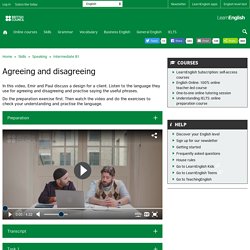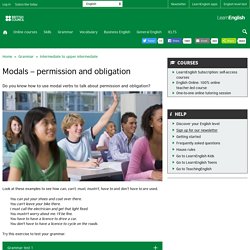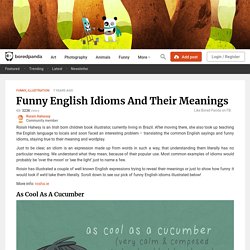

Reading Lesson: Teenage Problems – Giving Advice. By Kenneth Beare, About.com Guide Aim: Building reading comprehension and advice giving skills / focus on modal verb ‘should’ and modal verbs of deduction Activity: Reading about teenage problems followed by group work Level: Intermediate – Upper Intermediate Outline: Start off the lesson by asking students to suggest what type of problems teenagers typically may have.Use one of the problems mentioned and inductively review modal verbs of deduction by asking questions such as, “What must have happened to the boy?”

Teenage Problems – Giving Advice questionnaire: Read your situation and then answer the following questions What might the relationship be between the person and his / her parents? Teenage Problems: Texts. Escape from London. Agreeing and disagreeing. Ana: Hi!

Modals – permission and obligation. Look at these examples to see how can, can't, must, mustn't, have to and don’t have to are used.

You can put your shoes and coat over there. You can't leave your bike there. I must call the electrician and get that light fixed. You mustn't worry about me. I'll be fine. Try this exercise to test your grammar. Read the explanation to learn more. Skills for the 21st-century workplace. Have you got the skills you need for the 21st-century workplace?

We need to develop all kinds of skills to survive in the 21st century. Some, like ICT skills and knowledge of the digital world, are taught explicitly in schools in the UK. Here are five less obvious ones for you to think about. These are the sorts of skills that employers may ask you questions about in interviews, so it’s a good idea to think about how good you are in these areas. What are your strengths and weaknesses? Hogwarts Digital Escape Room. What is going to happen? - Kártyaosztó. First conditional - finish the sentence - Doboznyitó. Conditional - Szerencsekerék. First and Second Conditional stems - Kártyaosztó. Weareteachers. This year, we’ve been dreaming about travel more than ever before.

And while travel is tough right now, our bucket list of destinations is bursting at the seams. To keep everything organized, we created this printable list with our friends at EF Tours. Having everything in one place will make it easier to pick that first trip once you’re ready to travel again. Use this two-page printable to inspire your students to think outside of their classroom walls, no matter which subject you teach. On the first page, students list their top 10 dream destinations. On page two, the sky is the limit! Create a literary travel bucket list Perfect for English class! Focus on Foreign language Can your kids write about three destinations where Spanish is the native language? Tie it back to math Challenge your kids to calculate how far the destinations are from where they live now. Become a history buff Ask students to write about places where famous historical figures made an impact. Funny English Idioms And Their Meanings. Roisin Hahesy is an Irish born children book illustrator, currently living in Brazil.

After moving there, she also took up teaching the English language to locals and soon faced an interesting problem – translating the common English sayings and funny idioms, staying true to their meaning and wordplay. Just to be clear, an idiom is an expression made up from words in such a way, that understanding them literally has no particular meaning. We understand what they mean, because of their popular use. 2. Nostalgia Story – Fluency First ELT. This task focuses on sharing personal experiences, a category Willis (1996) includes in her taxonomy of task types; unlike other types, there is no problem to solve, no information or opinion gap to close, simply the (sometimes bittersweet!)

Pleasure of reminiscing about happy times, something we tend to do frequently – perhaps more so than ever right now. I’ve found it be one that many adult learners find highly engaging, and it is scalable in terms of level, assuming the right support is provided and we are not too ambitious in our expectations of what our learners can do. The material provided is for B1-B2 but see the notes at the end for lower levels. Pre-task: 1. 2. 3. 7. Bucket List – Fluency First ELT.
Sometimes going through major life changes can make you look back over your life, and forward to the future.

Perhaps, with the lifting of restrictions in late spring, the appearance of a chink of light between the doors of confinement has turned students’ thoughts to future possibility? This task focuses on students’ life ambitions that they would still, realistically, like to fulfil – a bucket list. The origin of the term, when students ask, is actually the idiom kick the bucket and, more specifically, the 2007 movie starring Jack Nicholson and Morgan Freeman. Pre-task: After opening the lesson with a chat (in open class) about achievements and memorable days, students read through the following popular options for bucket lists (don’t introduce the term yet.), asking which of these things have you done and which would you still like to do?
Main Task.